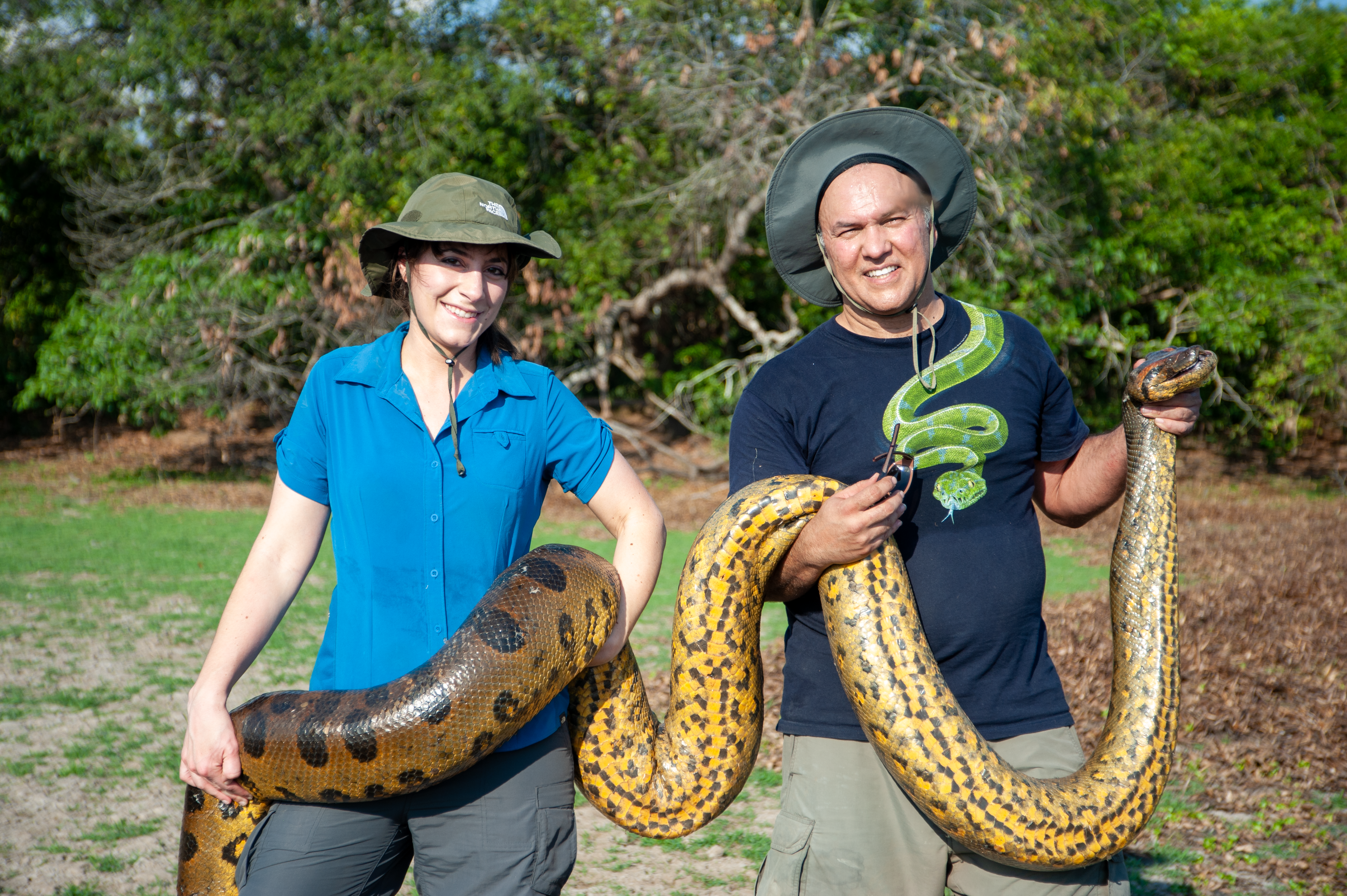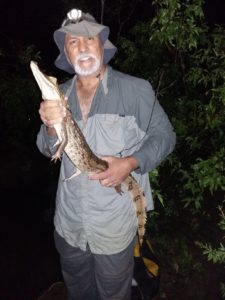
Wildlife Biology and Conservation
Highlands is offering a new degree in Wildlife Biology and Conservation. It’s perfect for students who are keen to work hands-on with wildlife and to preserve and manage the environments they inhabit.
While earning your degree, you’ll get direct experience in the field, and close mentorship from outstanding faculty with expertise in a number of areas.
 Who’s teaching?
Who’s teaching?
You will work with respected professionals like Dr. Jesús Rivas, who has published the definitive book on the anaconda — “Anaconda: The Secret Life of the World’s Largest Snake.” Rivas has taken many students on international field trips to study anacondas and other wildlife in their natural habitats.
Your instructors also include Dr. Sarah Corey-Rivas, an expert in genetics and non-invasive wildlife studies, and Dr. Ben Nelson, a veterinarian with more than 40 years of experience in wildlife diseases.
Our faculty have led field teams to study tropical ecology in Belize and Mexico. They have spent time on Padre Island and in Yasuni National Park studying the estuarine community, and have conducted field research in Venezuela to study anacondas, caimans and turtles. They’ve supervised teams in Venezuela, Ecuador and Brazil for hands-on practical experiences and research.
Where will your goals take you?
Is this degree right for me?
If you are interested in wildlife management and fisheries, in conservation, and in classwork that includes international field courses and supervised research, then yes! This is for you.
Fill out the form at the top of this page for more information on how to get started in an exciting career in wildlife biology and conservation!
Opportunities for Employment
Students graduating with a B.S. in Wildlife Biology and Conservation have many immediate employment opportunities. They will qualify for jobs as wildlife refuge manager; wildlife biologist; game warden; and conservation officer. There are also positions in zoos and other organizations that work with wildlife. Graduates from this program will have the course work required to become a Certified Wildlife Biologist by The Wildlife Society.
Additionally, jobs in the private sector are available to graduates including field survey and environmental consulting firms, private wildlife management, and outdoor adventure outfitter companies. Graduates can find employment in municipal, state or federal parks and gardens, and other public outreach/education positions, as well as in the K-12 system.
Opportunities for Advanced Degrees
Graduates from our Wildlife Biology and Conservation program are ready to enter many graduate and professional programs leading to advanced degrees. In fact, they can seamlessly transition into our own master’s program. Graduates will be prepared for master’s or doctoral programs in biology, ecology, wildlife, zoology, organismal biology, conservation, and related fields. Graduates can pursue degrees in veterinary medicine–with a focus on wildlife, zoo animals, and exotic pets.
The bachelor of science in Wildlife Biology and Conservation allows students to specialize in the fields of wildlife, ecology, zoology, and conservation biology. Students interested ecology and wildlife conservation or management will take courses that meet qualifications for careers with state or federal agencies, zoos, or other areas as wildlife biologists, ecologists, field researchers, zoologists, wildlife refuge biologists and managers, and other wildlife fields. Students earning this degree will also be well prepared for graduate school in ecology, wildlife, conservation, and management or work as an applied field researcher.
Degree requirements
Total Program Credits: 73-76
Program foundation course requirements: 40-43
Electives from the following specialization clusters must total 18 credits (at least 6 must be from the wildlife cluster):
Wildlife Cluster
Botany Cluster
Habitat Management Cluster
Fisheries Cluster
General STEM requirements: 15
General Chemistry
Applied Calculus
Quantitative Methods
Physics I for STEM
Faculty
Jesús Rivas, Ph.D., C.W.B.
PROFESSOR AND DEPT. CHAIR HERPETOLOGY, WILDLIFE MANAGEMENT AND CONSERVATION
Angelique Arias, B.A.
ADMINISTRATIVE ASSISTANT
Sarah Corey-Rivas, Ph.D.
ASSOCIATE PROFESSOR, WILDLIFE CONSERVATION AND GENETICS/GENOMICS
Eric Griffin, Ph.D.
ASSISTANT PROFESSOR BOTANIST/PLANTS MICROBIOME
Sebastian Medina, Ph.D.
ASSISTANT PROFESSOR,
CELLULAR BIOLOGIST/ECOTOXICOLOGIST
Justine Garcia, Ph.D.
ASSISTANT PROFESSOR, EVOLUTIONARY MICROBIOLOGIST
Will Jaremko-Wright, M.Sc.
INSTRUCTOR, ORNITHOLOGIST
Cody Godwin, Ph.D.
VISITING ASSISTANT PROFESSOR OF BIOLOGY, HERPETOLOGIST
Maureen Romine, Ph.D.
PROFESSOR, BOTANIST
Daryl Williams, M.Sc.
STOCK ROOM MANAGER, FIELD & LAB EQUIPMENT
Jessica Snow, Ph.D.
ASSISTANT PROFESSOR CELLULAR BIOLOGIST
Ben Nelson, D.V.M.
ASSISTANT PROFESSOR, VETERINARY MEDICINE/RANGE MANAGEMENT
Our Mission
The mission of this program is to provide students with a high-quality science education that includes experience with research and field projects. The program provides a scientific and technical background that empowers students to successfully pursue science and technology careers in wildlife biology and its conservation or management or proceed on to advanced graduate or professional studies. This program integrates applied field experiences and research to prepare graduates for wildlife careers.
